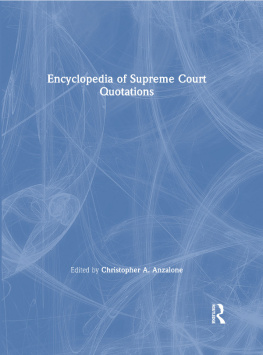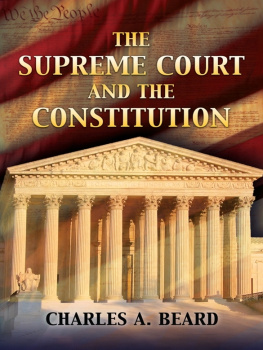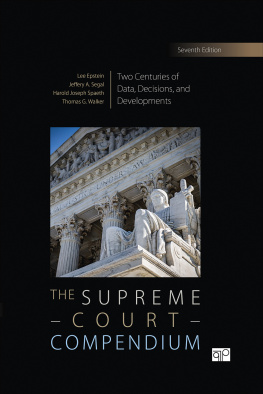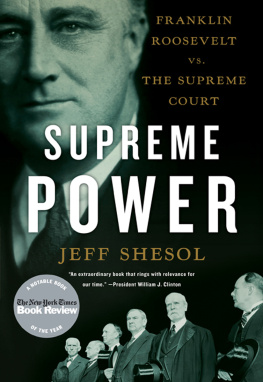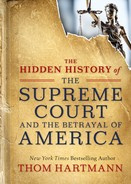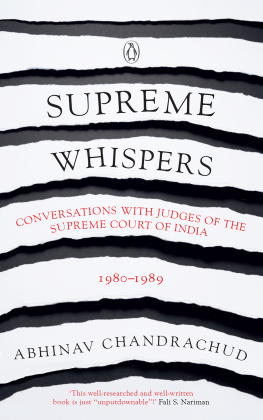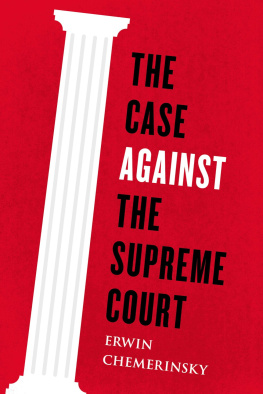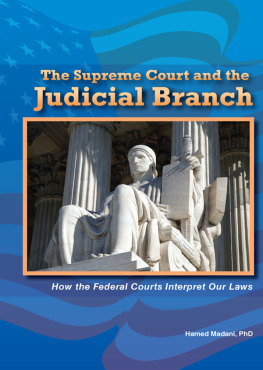ENCYCLOPEDIA OF
SUPREME COURT QUOTATIONS
First published 2000 by M.E. Sharpe
Published 2015 by Routledge
2 Park Square, Milton Park, Abingdon, Oxon OX14 4RN
711 Third Avenue, New York, NY, 10017, USA
Routledge is an imprint of the Taylor & Francis Group, an informa business
Copyright 2000, Taylor & Francis. All rights reserved.
No part of this book may be reprinted or reproduced or utilised in any form or by any electronic, mechanical, or other means, now known or hereafter invented, including photocopying and recording, or in any information storage or retrieval system, without permission in writing from the publishers.
Notices
No responsibility is assumed by the publisher for any injury and/or damage to persons or property as a matter of products liability, negligence or otherwise, or from any use of operation of any methods, products, instructions or ideas contained in the material herein.
Practitioners and researchers must always rely on their own experience and knowledge in evaluating and using any information, methods, compounds, or experiments described herein. In using such information or methods they should be mindful of their own safety and the safety of others, including parties for whom they have a professional responsibility.
Product or corporate names may be trademarks or registered trademarks, and are used only for identification and explanation without intent to infringe.
Library of Congress Cataloging-in-Publication Data
Anzalone, Christopher A., 1963-
Encyclopedia of Supreme Court quotations / Christopher A.
Anzalone.
p. cm.
Includes index.
ISBN 0-7656-0485-X (alk. paper)
1. United States. Supreme CourtEncyclopedias. 2. LawUnited
States Quotations. I. Title.
KF8742.A35A59 2000
347.73" 26dc21 99-41504
CIP
ISBN 13: 9780765604859 (hbk)
Dedication
This volume is dedicated to three very important people: Karen, my wife, whose good humor gave me the inspiration to read just one more Supreme Court caseday after day, night after night; Patricia, my mother, who was the first to instill in me my love for the law; and Anthony, my father, who was unable to see this effort through to its conclusion, but would undoubtedly be pleased with its logic, perspective, and evenhanded approach.
... to do our utmost to make clear and understandable the reasons for deciding cases as we do.
Douglas v. Jeanette 319 U.S. 157 (1943) Associate Justice Robert H. Jackson, concurring
It is a joy to take my pen in hand and endeavor to write for the gracious and civilized society to which free men aspire.
U.S. Supreme Court Associate Justice Frank Murphy to Henry M. Bates, former dean of the Michigan Law School (December 25, 1943)
If the Supreme Court is ever composed of imprudent men or bad citizens, the Union may be plunged into anarchy or civil war.
Alexis de Tocqueville
The symbolic language selected by our nations leadershistorical and contemporaryhas a profound impact on the evolution of our democracy. Benjamin Franklin, Thomas Jefferson, and Alexander Hamilton created the nation. So did Chief Justice John Marshall. Abraham Lincoln fought to preserve a nation in turmoil. So did Justice John Marshall Harlan. Woodrow Wilson and Franklin Delano Roosevelt pushed the nation to its rightful place on the world stage. So did Justice Robert Jackson. Martin Luther King warned us that freedom and liberty could truly be achieved only by acceptance and equality. So did Justices Hugo Black, Thurgood Marshall, and William Brennan. It should be clear that the members of the Supreme Court have had a significant impact on American history. The words of the Court are, in fact, theories of government. Collectively, the passages included in this book, and those that are not, constitute the grand debate about the goals of democracy and its limitations, successes, and failures. Understanding the value of the Supreme Court is crucial to understanding our history. The Supreme Court is but one branch in our federal system. It competes with the presidency, the Congress, and the states. The other branches determine what is good. The judiciary, headed by the Court, determines what is right. The purpose of this book, therefore, is to give life to this very powerful, often misunderstood branch of federal government. The Court, its mechanisms for delivering its decrees, and the personalities of the members have been shrouded in mystery. For the most part, this mystery has been created and perpetuated by the Court itself. Its decisions, crafted in arcane, dusty language, are discernible only by the academic and legal elite. Although it is the only branch of government that provides painstakingly detailed and written analysis for most of their edicts, the specialized language ultimately is a disservice. For the government as a whole, as well as its integral components, must be understood first before it can be appreciated, accepted, and revered. This book will, in a nutshell, demonstrate that the Court is a human institution. The Court struggles with its mission. For the scores of steps it takes to force itself and the nation it is charged to protect into the future, there are occasional missteps and lapses, some accidental, others calculated. It has been a small (and fairly homogeneous) community of individuals (110 men, 2 women) who have presidedgenerally nine at a timeover the nations top court.
Several criteria were used to select the passages that appear on the pages that follow. Selection, however, was not as difficult as not selecting. Each year the Court decides hundreds of legal controversies. The Court has been in existence for over two hundred years. Decisions generate an opinion of the Court (majority opinion); depending upon agreement of the nine members of the Court, an outcome may also generate a flurry of concurring opinions and dissentsall of which constitute the universe of potential excerpts. The calculus is staggering; we could have easily selected a hundred thousand quotes. Is it not an inspiring notion that the total universe of excerpts is so overwhelming that great efforts were made to pare the number down to a manageable 900? This question in itself should fill the reader and citizen with pride in the Courts place in American history.
For the most part, the only criterion used in the selection process was the quotability of the passage. Inherent beauty, literary quality, profound philosophythese were the intersecting points determining what to include and what to omit. Arbitrary as this trinity may be, the selections are typically not the rationale of a given decision, rather the obiter dicta generally favored. An intensive effort has been made to avoid excessively legalistic or complex passages. The quotes should be able to stand on their own. I would like to think the selections follow Chief Justice Charles Evans Hughess posit on the four corners of good judicial craftsmanshipaccuracy, clarity, conciseness, power.
Like Thomas Jeffersons Dialogue Between Head and Heart, there should be dual consequences of each passage. On the visceral side, if there is an instinctive raising of the readers eyebrow and a thoughtful hmm, then inclusion of the quote was appropriate. However, if the reader frowns in disbelief at the passage, then we are equally pleased with our choice. If, on some cerebral plane, the passage stimulates some unfulfilled intellectual appetite and the reader strives to consume the entire decision, then the selection was appropriate.

